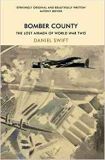Bomber County by Daniel Swift
Bomber County is, of course, Lincolnshire where squadrons of Beaufighters, Wellingtons, Halifaxes and Lancasters were huddled in hangars for combined raids against enemy targets in German occupied Europe. As the war progressed the targets escalated, from attacks against the German Fleet, the industrial complex of the Ruhr and later, with the aim of breaking enemy morale, the targets included the cities - including Hamburg, Berlin, Dresden and Cologne. Night after night, crews already warmly dressed in jerseys and thick woollen socks zipped themselves into flying suits and made their way towards the enemy coast. Conditions were cramped and the temperatures plummeted as they gained altitude flying by the light of the moon to their appointed destinations.
| Bomber County by Daniel Swift | |
|
| |
| Category: History | |
| Reviewer: George Care | |
| Summary: An overview of the poetry and morality of the Second World War Bomber Campaign in relation to the personal family loss of the author’s grandfather, a Lancaster pilot in 1943. | |
| Buy? Yes | Borrow? Yes |
| Pages: 304 | Date: August 2010 |
| Publisher: Hamish Hamilton | |
| ISBN: 978-0241144176 | |
|
| |
Later in the War, navigators were able to use the hazy reflected signals of H2S to guide them over the changing relief of the land towards enemy territory. Ack-ack batteries, enemy nightfighters and flak over the target took a heavy toll on crews. This book relates the loss of one pilot, James Eric Swift of 83 Squadron on a raid on Munster, early in June 1943. His body was later discovered washed up on a beach in Holland. In this multi-layered book Daniel Swift, his grandson, sensitively retells this family story. He is further inspired to explore a range of related issues from poetry and literature to the morality of the bombing campaign as it was conducted later in the War.
The cover of this handsomely produced volume depicts the distorted perspective of aerial warfare as depicted by Paul Nash; it shows that visual arts produced effective responses to combat. The contrasting situation in poetry is examined throughout the book in counterpoint to the narrative. From classical times Virgil declared Arma virumque cano (I sing of arms and man) in The Aeneid but this kind of warfare has weaponry that operates at speed and men have little time for reflection unlike the poets of The Great War; Owen, Rosenberg and Sassoon. Daniel Swift refers to the dirge like rhythms of Dylan Thomas’s A Refusal to Mourn the Death, by Fire, of a child in London which despite the title, is a deeply moving elegy. The author also has much to say of interest on TS Eliot and Virginia Woolf’s responses to the Luftwaffe’s raids.
Swift makes mention of a small number of poems written by pilots like those encouraged by C Day Lewis. There is an exhilaration in flight which has been memorably captured by the lyrical French writer Antoine de St Expurey. Poetry is also inspired by heroism and myths such as that of Ovid’s Daedulus and Icarus, Such matters prompt Swift to tender family reflections and musings on the writings of Auden and Isherwood. These considerations make this an unusual memoir for his Squadron Leader Grandfather about whom Swift has thoroughly researched the archives.
Poetry was very popular during the Blitz, however, it sits awkwardly with mass bombing and firestorming and its effect on civilian populations. Swift who teaches English Literature at Skidmore College in upstate New York is aware of the arguments concerning the morality of debates on such issues which continue to rage on and indeed intensify in relation to more recent conflicts. Arguments and emotions proposed and expressed by Orwell, Churchill and the ethical arguments on the effect of such destructiveness by AC Grayling and other philosophers are briefly outlined.
Did the barbarism of the Nazis justify the adoption of the ruthless means of waging war that led to Slaughterhouse V? The poetry falters as we consider events that ended that conflict; the use of Nuclear Weapons and the emerging political doctrine of Mutual Assured Destruction. Swift examines and acknowledges many of the issues including the guilt about delivering death at a distance – especially in relation to the poetic recollections of James Dickey; a poet to thank the author for here introducing to a wider audience.
This interesting, informative and hybrid book should remind us all that the poetry as Wilfred Owen stated, lies in the pity. This pity must eventually bring reconciliation. However, UN estimates on August 10th, less than a month ago, quoted in the Guardian of that date; show the number of child casualities in Afghanistan has soared by 55%, despite strict rules on the use of airpower by NATO troops. This heartfelt first book reminds us that the best memorial to lost grandparents is to earnestly strive for peace for our grandchilldren.
I'd like to thank Penguin Books under The Hamish Hamilton imprint for sending a copy to The Bookbag.
Further reading suggestion:
Please share on: ![]() Facebook,
Facebook, ![]() Twitter and
Twitter and
![]() Instagram
Instagram
![]() You can read more book reviews or buy Bomber County by Daniel Swift at Amazon.co.uk Amazon currently charges £2.99 for standard delivery for orders under £20, over which delivery is free.
You can read more book reviews or buy Bomber County by Daniel Swift at Amazon.co.uk Amazon currently charges £2.99 for standard delivery for orders under £20, over which delivery is free.
![]() You can read more book reviews or buy Bomber County by Daniel Swift at Amazon.com.
You can read more book reviews or buy Bomber County by Daniel Swift at Amazon.com.
Comments
Like to comment on this review?
Just send us an email and we'll put the best up on the site.

